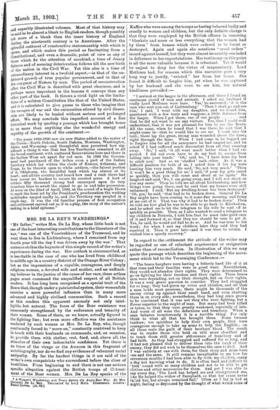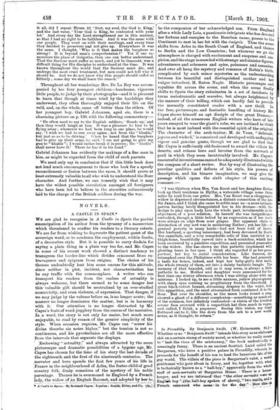MRS. DE LA REY'S WANDERINGS.*
"My father," writes Mrs. De La Rey, whose little book is not one of the least interesting contributions to the literature of the war, " was one of the Voortrekkers of the Transvaal, and he went then to live in Lichtenburg, where I remained from my fourth year till the day I was driven away by the war." That sentence strikes the keynote of this simple record of the writer's experiences during the war. Her outlook is circumscribed, as is inevitable in the case of one who has lived from childhood to middle age in a country district of the Orange River Colony; but as the impressions of a capable, courageous, and deeply religious woman, a devoted wife and mother, and an unflinch- ing believer in the justice of the cause of her race, these artless pages must command the unqualified respect of all British readers. It has long been recognised as a special trait of the Boers that, though under a patriarchal system, their womenfolk exercise a more powerful influence than in many more advanced and highly civilised communities. Such a record as this renders this apparent anomaly not only intel- ligible, but natural. The force of the Boer resistance was immensely strengthened by the endurance and tenacity of their women. Some of them, as we know, actually figured in the fighting line; but even more effective was the assistance rendered by such women as Mrs. De La Rey, who, though continually forced to "move on," constantly contrived to keep in touch with their husbands on commando, and, on occasion, to provide them with shelter, rest, food, and, above all, the stimulus of their own indomitable confidence. Yet there is no trace of the virago or the Amazon in this fragment of autobiography, nor do we find any evidences of vehement racial antipathy. By far the hardest things in it are said of the writer's own compatriots who surrendered before the close of hostilities. From beginning to end there is not one seriou specific allegation against the British troops of ill-treat- ment of the Boer women. Mrs. De La Rey speaks of the
• I Woman's Wanderings and Tries during the ling:G.13w War. By Mrs.
Mewl!) De La Hey. Translated by Lacy Hots. Illustrated. London : hiker Bums. [2s. 6d.]
a superbly illustrated volumes. Most of that history may Baffin who were among the troops as having behaved badly and
cruelly to women and children, but the only definite charge is that they were employed by the British officers in removing " blankets and more or less everything that the women had by them" from houses which were ordered to be burnt or destroyed. Again and again she mentions " cruel orders " issued against herself, but they were almost invariably rescinded in deference to her expostulations. Her testimony on this point is all the more valuable because it is reluctant. Yet it would be unjust to deny her the virtue of magnanimity. Lord Methuen had, for reasons which this narrative goes a very long way to justify, " evicted " her from her home. She found it difficult to forgive him, yet when he was captured by her husband and she went to see him, her natural kindliness prevailed :-
" I arrived at the Jaeger in the afternoon, and there I found an enormous crowd of men and animals. I asked my husband if really Lord Methuen were here. Yes,' he answered ; it is the man who sent you out of Lichtenburg.' Then I shall go and see him,' I said. I went with my daughter, and we found him, quartered with a few tents and waggons, a little distance from the laager. When I got there, one of our people said that he did not want to see any visitors. Yes, that I could well understand, that it was not pleasant for him to see the Boers. All the same, when he heard that I was there, he said that I might come in—that ho would like to see me. I went into his tent; there lay the great, strong man wounded above the knee; right through the bone. When I had come in he begged me to forgive him for all the annoyance he had caused me, and he asked if I had suffered much discomfort from all that running away. ' No,' I said, it all went much better than I had ex- pected. I did not even have to do my best to escape from falling into your hands.' Oh,' said he, ' I have done my best to catch you.' And so we 'chaffed' each other. As it was a difficult position for both of us, I asked him if his leg were hurting him very much. He said, No, not very much.' Then it won't be a good thing for us,' I said,' if your leg gets cured so quickly, then you will come and shoot at us again.' He laughed and said, ' No, I am going away, and I will not shoot at you any more.' Then he told me all about Lichtenburg, and how things were going there, and he said that my houses were still unharmed. I said, ' But my dwelling-house has been destroyed.' Oh, yes,' he said, that had to be broken down. General De La Rey might have been coming to it some fine morning and firing at me out of it. That was why it had to be broken down.' Then he told me how glad he was to be able to go back to Klerksdorp, and he asked me to let the telegram to his wife be sent off as quickly as possible. Then, as I also wanted to send a telegram to my children in Pretoria, I told him that he must take good care of it and forward it, so that they too should be sure to get it. Yes, he said, he would not fail to do so. And he was true to his word ; for when I met my children later they said they had received it. Then it grew late—and it was time to return. I wished him a speedy recovery."
In regard to the cettlement the attitude of the writer may be regarded as one of reluctant acquiescence or resignation rather than of reconciliation. In illustration of this we may quote the passage which describes the beginning of the move. ment which led to the Vereeniging Conference
"The brave burghers were having a bitterly hard life of it at that time and their families were in great want. Nevertheless, they would not abandon their rights. They were determined to go on fighting for their freedom and their rights. These brave men were depending, not on their strength, but on their rights. It was a very grave question to consider. They had struggled for so long ; they had given up wives and children, and all that a man holds most precious; there might be thousands of the enemy rising up against their small band, and even shutting them in on every side; nevertheless, they had long since grown to be convinced that it was not they who were fighting, but a Power superior to the might of man. But many had been killed or taken, so that they were greatly weakened, especially of late. And worst of all were the defections and treachery. When a man behaves treacherously it is a terrible thing. For only think to what all that has brou?ht them. Some became traitors; too spiritless to help their own people, they were courageous enough to take up arms to help the English ; on all those rests the guilt of their brothers' blood. The result was to render those who held on still more steadfast and to teach them still greater abhorrence of treachery and of bad faith. As they had struggled and suffered for so long, and it had not pleased God to deliver them into the hand of their enemy, they did not wish to be themselves the ones to do it. And I was entirely at one with them, for their story and mine were one and the same. It still remains inexplicable to me how for seventeen months I had been able to fly with my children, many a day not knowing what to do. It is often hard and difficult to `trek' round with so many children and not to be able to get clothes and other necessaries for them. And yet I was able to say every day, The Lord has helped me and strengthened me, like He helped the widow of Zarephath, so that her cruse never tailed her, but always remained full.' Often as I lay in bed at night, feeling so depressed by the thought of what would come at it' all, did I repeat-Hymn 22, Rest, my soul, thy God is King,' and the last verse, Your God is King, be contented with your lot.' And every day the Lord strengthened me in this manner, so that I had no right to be faithless. And it was the same with our people. They went on with their meetings, and every time they decided to persevere and not give up: Everywhere it was the same. I thought, Who is it that makes the burghers so strong ? It is beyond man's comprehension ?' Yet if one re- members the place of Golgotha, then one can better understand. That the Saviour must suffer so much, and yet be innocent, was a difficult thing for His disciples to understand at the time. It was known throughout the world that the Saviour must die, and undergo the most cruel treatment, but men could not tell why it should be. And we do not know why this people should suffer so bitterly ; some day we shall learn the reason."
Throughout all her wanderings Mrs. De La Rey was accom- panied by her four youngest children—handsome, vigorous little people, to judge by their photographs—and it is pleasant to learn that though at times tried by the hardships they underwent, they often thoroughly enjoyed their life on the veld, and, on the whole, came off better than the elders. Of her youngest boy, Gabriel Johannes, aged six, there is a charming picture on p. 139, with the following commentary :—
" He often used to say to the English soldiers, ' Hands up,' and then they would laugh at him. It was a pleasure to him to be flying away; whenever we had been long in one place, he would say, ' I wish we had to run away again ; not from the " khakis," but just so as to be driving.' 11? hen he heard that the burghers had to give up their arms, he said, I am not going to give my gun to " khakis " ; I would rather break it in pieces ; the " khakis" shall never have it.' There he has it in his hand."
Gabriel Johannes has evidently the makings of a fine man in him, as might be expected from the child of such parents.
We need only say in conclusion that if this little book does not lend much encouragement to those who look for a speedy reconcilement or fusion between the races, it should prove at least extremely valuable to all who wish to understand the Boer character. And further, we can honestly wish that it may have the widest possible circulation amongst all foreigners who have been led to believe in the atrocities calumniously laid to the charge of the British soldiers during the war.











































 Previous page
Previous page